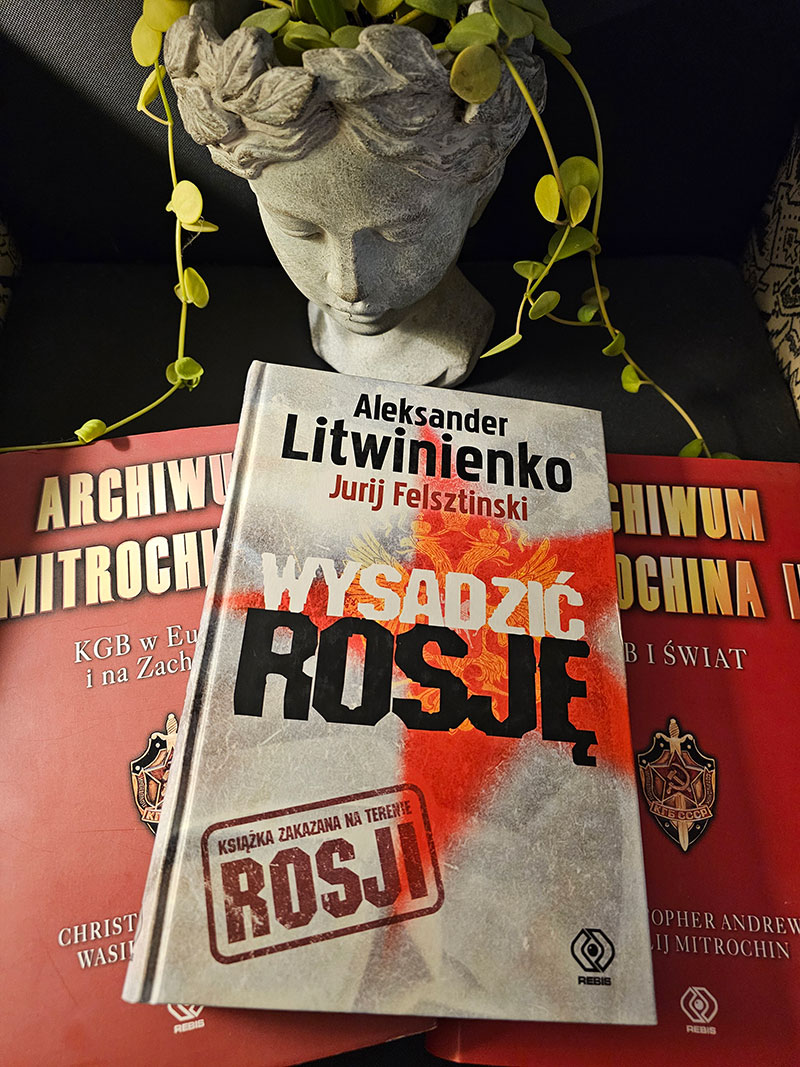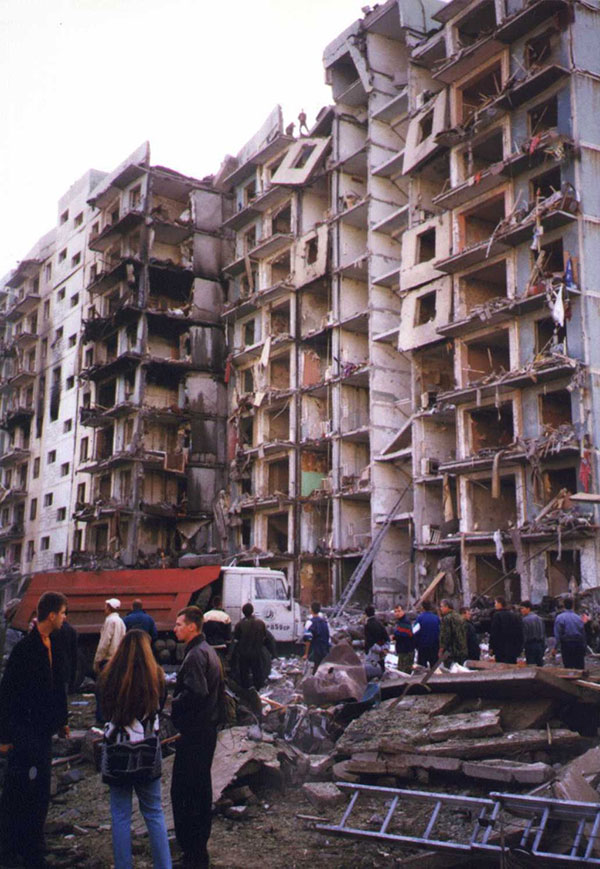In this article, I undertake an amateur analysis and engage in a debate with the theses presented by Adam Majchrzak from demagog.org.pl regarding the theories about the bombings in Russia in 1999. I focus on the challenges associated with information analysis, presenting arguments for and against classifying this theory as a conspiracy. Can we indeed dismiss this theory as incredible, or should we seek deeper reasons for its disavowal? I aim to draw attention to the complex boundary between confirmed fact and interpretation in the world of fact-checking and information analysis, as well as the consequences that interpretative choices lead to.
Table of Contents
What is this article about
Today, I would like to engage in a small polemic with myself and with a text by Adam Majchrzak, who is an analyst and mentor at the fact-checking organization demagog.org.pl. I undertake this polemic as an amateur and demonstrate through a specific example the problem with information analysis and how to draw consequences if information is discredited - in my opinion, it’s important to go further and ask why it is discredited.
I want to highlight the complex boundary between confirmed fact and interpretation in the world of fact-checking and information analysis.

Demagogue’s conspiracy narrative
The text presenting the construction and functioning of conspiracy narratives is very well written and accessible. It offers a comprehensive overview of the mechanisms of conspiracy theories and conspiratorial thinking. I also understand the postulated principle that extraordinary claims require extraordinarily solid evidence. However, in differentiating between conspiracy theories, I do not understand the criteria the author used in dismissing the concept of the FSB’s involvement in the bombing of residential buildings in Dagestan and labeling it as a conspiracy theory with the possibility of being confirmed as a fact if an investigation is conducted (which sounds absurd in the context of Russia and its already conducted and classified investigations). I miss a footnote or context explaining on what basis this theory was deemed conspiratorial (i.e., false).
One such theory suggests that in September 1999, the Federal Security Service of the Russian Federation (FSB) orchestrated a bomb attack on residential buildings in Buynaksk, Dagestan. The authorities blamed the Chechen community for this event. However, the incident has not been fully explained to this day.
After the event, many accusations emerged that it was the Russian state – not the Chechens – that organized the attack. Vladimir Putin was believed to have benefited from fostering animosity towards this group. The event undoubtedly contributed to this, yet mere suspicion is not enough to fully prove responsibility and dispel doubts. The only solution would be an investigation that would prove the truth of such an assumption – but this is not always possible.
Some real conspiracies may never come to light, while impossible-to-fulfill conspiracy theories continue to emerge en masse.
Read more at:
Polish: Teoria spiskowa – prawda czy fałsz? Krótko o zupie „spiskówce”…
Fact-Checking Values
It is certainly possible to accept that the construction of media narratives can be false. However, in the fact-checking values themselves, Demagog suggests verifying the source and reputation from which the presented facts and news originate (demagog - methodology). Therefore, I would like to know on what basis is the book written by Russian historian living in the USA, Yuri Felshtinsky, and former counterintelligence lieutenant colonel Alexander Litvinenko, among others, dismissed? I have never seen this source marked as false. The latter was a lieutenant colonel in the KGB (counterintelligence) and FSB (Criminal Organizations Division). He fled Russia after exposing an order to assassinate Boris Berezovsky, which led to a series of harassments, trials, and investigations against him. It is important to note that when fleeing Russia, he took many recordings and documents with him.

It was the information possessed by Alexander Litvinenko that allowed him to co-author a book with Felshtinsky, presenting evidence of FSB’s involvement in preparing the bombings that gave Putin a casus belli to restart the war in Chechnya and to strengthen his image as a strong and uncompromising leader.
The 1999 Terrorist Attacks in Russia
Let’s recall the basic facts. In September 1999, Russia experienced a series of explosions in residential buildings in the cities of Buynaksk, Moscow, and Volgodonsk. Regardless of what Litvinenko claimed, in the case of the Volgodonsk bombing, the Chairman of the Duma informed the deputies about it three days before the actual attack occurred - a surprising ability to predict the future.
In Ryazan, there was a failed attack. A vigilant resident noticed unusual behavior from strangers and revealed that they had supposedly planted heavy bags of sugar. A pyrotechnic test allegedly did not show explosive properties of these materials. It quickly became evident that the Moscow branch of the FSB and its agents operated in Ryazan and were executing this operation. It was only the actions of the local police, revealing the whereabouts of the supposed attackers, that led to a nervous FSB chief appearing on television to announce that the Moscow FSB unit was conducting exercises. These pieces of evidence, among others, were discussed in Litvinenko’s book and another publication by Yuri Felshtinsky and Vladimir Pribylovsky, The Corporation of Assassins.

The events leading up to the attack are also of great interest. As we can read in an article on TVN24:
In June 1999, two correspondents from major Western newspapers reported from Moscow about alarming rumors that “state terrorism” acts might occur in Russia. The purpose was supposedly to sow fear and panic among the population. On June 6, 1999, Jan Blomgren, a Swedish correspondent for “Svenska Dagbladet”, reported on rumors of impending bomb attacks that would be blamed on the Chechens. On June 16, Giulietto Chiesa from Italy’s “La Stampa” wrote: “With a high degree of certainty, it can be said that bomb explosions killing innocent people are always planned by people with political motives, interested in destabilizing the situation in the country… These could be foreigners, but they might also be ‘our own people’ trying to intimidate the country.”
On July 22, an article by Alexander Zhylin appeared in “Moskovskaya Pravda”, warning of terrorist attacks in Moscow. Zhylin quoted a document that supposedly “leaked” from the Kremlin. It indicated a plan to discredit Yeltsin’s political opponents, particularly Moscow Mayor Yuri Luzhkov and former Prime Minister Yevgeny Primakov. In the text titled “Storm in Moscow” (which was supposed to be the codename of the planned special operation), the Russian journalist wrote: “The President’s administration has prepared and adopted (the individual points were presented to Yeltsin) a comprehensive plan to discredit Luzhkov through provocations aimed at destabilizing the socio-psychological situation in Moscow… The city awaits a huge shock. There are plans to carry out loud acts of terrorism (or attempts).”
In August, in very strange circumstances, there was the famous expedition of a thousand-strong Chechen field commander Shamil Basayev’s unit into neighboring Dagestan. […] Basayev’s unit encountered no obstacles from Russian forces at the border – both when entering Dagestan and when withdrawing. Immediate reminders followed of unofficial reports about Basayev’s collusions with Boris Berezovsky, then the “grey cardinal” of the Kremlin. Russian media, as well as “Le Figaro” and “Le Monde”, reported on secret meetings between Berezovsky’s close associate Alexander Voloshin and Basayev in July 1999 on the French Riviera. The tabloid “Moskovsky Komsomolets” published excerpts of alleged wiretapped conversations of Berezovsky, suggesting he financed the raid on Dagestan. […] Klebnikov was shot dead on a Moscow street in 2004. Basayev died in 2006. Patarkatsishvili suddenly died of a heart attack in London (February 2008). Berezovsky also died in London under highly dubious circumstances (allegedly a suicide) in March 2013.
Eksplozje, które dały Putinowi władzę. Kto wysadzał bloki w Rosji? - TVN24
In 2001, seven people were convicted for their involvement in the attacks. The organizers revealed in 2004: Achemez Gochiyayev disappeared and had not been seen since 2002, while the direct orders were given by Ibn Al-Khattab and Abu Omar al-Saif, both of whom were killed. The trial itself was partially classified, and a few years later, in 2006, Litvinenko was poisoned by Russian services using the radioactive isotope polonium.
Why Not Further Question Russian Leads?
Following the line of reasoning of Majchrzak, one would also have to question Red Notice by Bill Browder. Why should this information be considered more factual and true when for many years Browder unsuccessfully tried to get Western politicians and journalists interested in the mafia-like nature of the Russian services and state? It was only after a film published on Youtube that the case gained publicity, and it is on the basis of this case, i.e., the criminal nature of the Russian state, that the Magnitsky Act was created, which forms the basis for economic sanctions against citizens and entities involved in human rights abuses and corruption abroad. According to Demagog, why are Browder’s information more valuable than Litvinenko’s book, who gave his life to disclose information about the FSB and Putin?
COMMENT: The Browder case seemingly has nothing to do with Litvinenko, but in reality, it’s analogous to how whistleblowers or those entangled in a case reveal it. In Browder’s case, the British government (if I remember the content of the book and interviews correctly) was not interested in escalation for political reasons. I treat these cases similarly because we have material in the form of documents that we interpret and can confront.
Criticism of the Theory
I suspect that the author I am debating relies on the criticism of this theory:
However, many experts are critical of the above theories. Russian journalists Andrey Soldatov and Irina Borogan believe that the incident in Ryazan was actually just an FSB training exercise[5]. Strobe Talbott, a former U.S. Deputy Secretary of State, pointed out the lack of convincing and unequivocal evidence of the involvement of Russian special services in the attacks[6]. Professor Robert Bruce Ware of Southern Illinois University Edwardsville argued that the simplest explanation for the explosions in the residential buildings is that they were indeed carried out by Islamic extremists[7]. 1999 Russian Apartment Bombings – Wikipedia, the Free Encyclopedia
It is worth noting, however, that while the Polish Wikipedia version questions the conspiracy theory as unjustified, the English version presents various concepts as references, showing arguments for and against.
The attacks were widely attributed to Chechen terrorists, although their guilt has never been conclusively proven.[15] Some historians and journalists claim the bombings were coordinated by Russian state security services to help bring Putin into the presidency.[16][17][18][19][20][21][22][23] Others disagree with such theories or argue that there is insufficient evidence to assign responsibility for the attacks.

Pursuing This Interpretive Trail and Drawing Conclusions
In my view, there currently lacks convincing arguments to dismiss the information published by Litvinenko, and the aforementioned counterarguments do not persuade me. It’s simply a prejudice, an unjustified assumption, or a pursuit of truth when unfortunately we only work with circumstantial evidence. However, if we were to follow this path, we would have to conclude that Litvinenko is lying. Let’s draw a consequence from such a statement regarding a man who, instead of living comfortably in the West, chose to reveal the truth and fight against Putin’s regime, ultimately paying with his life, dying in agony in front of the whole world.
We must, therefore, at this point, answer the question of what to do with the actor of this spectacle in the form of Litvinenko? Speaking ill of Russia, the FSB, but above all, the rising power of Putin. This leads us to the thought experiment of “what could have led to the discrediting of information provided by Litvinenko”. One simple and unrefined answer comes to mind: according to this interpretation, Litvinenko would be an element of the operational game of Western intelligence, and the information about FSB’s involvement in the bombings would be fabricated just as the fabricated (in another case) information about Saddam’s alleged biological and chemical weapons. False information about the FSB’s involvement in the bombing would then serve to weaken Putin’s growing position and attempt to polarize Russian society by creating conspiracy theories. And with this, we conclude our disassembling of the matryoshka.
Sources:
Teoria spiskowa – prawda czy fałsz? Krótko o zupie „spiskówce”…
Eksplozje, które dały Putinowi władzę. Kto wysadzał bloki w Rosji? - TVN24
Zamachy na budynki mieszkalne w Rosji Wikipedia
Aleksandr Litwinienko – Wikipedia
Jurij Felsztinski | Autor: Wszystkie książki, wywiady, artykuły | Lubimyczytać.pl
Wysadzić Rosję - Jurij Felsztinski, Aleksandr Walterowicz Litwinienko | Lubimyczytac.pl
Interview Aleksander Litvinenko - YouTube
Marina Litwinienko walczy o ukaranie morderców jej męża - YouTube
Ręce Moskwy sięgają daleko, cz. I: Przypadek Aleksandra Litwinienki | MISJA SPECJALNA - YouTube

